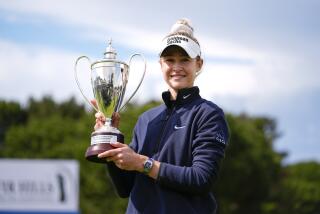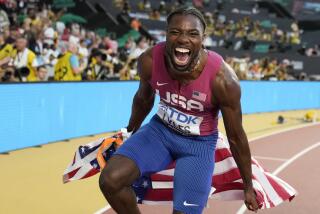Lyle Has Managed to Get His Life and Game Out of the Rough
- Share via
AUGUSTA, Ga. — From the London Sun, July 16, 1987, right before the British Open:
“EXCLUSIVE!
By SANDY LYLE
The break-up of my marriage has put me in better shape than I’ve ever been for an attack on the Open championship.
That’s the only bonus to emerge from the most painful period of my life.
When my wife Christine decided to walk out--sadly there is no chance of any reconciliation--it would have been easy for me to take a couple of months off, mope around and feel sorry for myself.
Instead, I got stuck into my game in the belief that hard work would be good therapy. The time I would normally have spent with my wife and children was used up on the practice ground.
I spent a lot of time in the United States this year--quite deliberately--because over there you can maintain your rhythm . . .”
Although they do not call him Sir Sandy--not yet, anyway--Alexander Walter Barr Lyle is, it so happens, a Member of the Order of the British Empire, as presented by the Queen. And, as such, he is subject to some of the hot gossip and private-life probing of the tabloid scandal sheets, the ones that stick their newsy noses into the businesses even of princes and princesses.
Lyle, 30, is just a guy who plays golf for a living. He isn’t qualified to do much else. Even he admits that he never felt bright enough to become a lawyer or something, or even to work in an office. We are talking about a guy here who failed the entrance examination to the University of Houston.
“Confidence doesn’t ooze out of me,” he says.
As golfers go, though, he definitely knows what he is doing, and has done so since he was a wee Scot lad. The family scrapbook shows little Sandy pictured in the Glasgow Evening Citizen in golf garb at age 3 1/2, with a caption claiming him capable of hitting a ball 80 yards. By the time he was 10 years old, he had broken 80 on his scorecard.
Golf was his life. It was in his blood, and even in his name. Sandy Lyle. Sandy Lie. His grandfather dug up a Scottish pasture six decades ago and carved a golf course out of it. His father learned the game there, then moved to England to become a club pro. Alex Lyle taught his son the tricks of the trade. He worked on everything, even Sandy’s disposition.
“Remember, tempo before temper. Tempo before temper,” he preached.
It sank in.
Sandy Lyle learned that no matter what goes wrong, no matter how bad things seem, don’t go off the deep end.
Even when you go into a ditch.
Augusta wind was light and cool, and so was the leader of the Masters when Sandy Lyle stepped to the 13th tee Saturday afternoon. There he was, four shots ahead of the nearest rival, eight shots under par on a golf course that was driving everybody else goofy. At this moment in time, 48 holes into the tournament, only six other players were under par. Augusta National was no day at the beach.
Except for Sandy. Everything was going his way. He was running away with the Masters--the 52-year-old classic no Briton has won. When 1976 champion Raymond Floyd finished Saturday’s play, about an hour before Lyle, he felt today’s final round might be just a formality, saying, “He is playing wonderful. He’s putting terrific, and I don’t see anyone catching him.”
It was around this same moment that Lyle reached the 465-yard, par-5 13th. He gauged the wind. He grabbed his driver. He got a little greedy. He went for the kill.
It’s an important hole, this 13th. When Byron Nelson won the Masters in 1947, he played it in 3-3-4-4 over four days. Jimmy Demaret did the same three years later, and so did Lloyd Mangrum in 1953. Yet, this is where Curtis Strange fell apart in 1985, costing him the championship, and Seve Ballesteros also has faltered here. Tommy Nakajima once took a 13 on 13.
Lyle hooked it into a ditch.
“I just took too much of a gamble, and paid the penalty for it,” he said.
That he did. After a free drop cost him a stroke, Lyle bogeyed the hole. Fuzzy Zoeller, in the twosome ahead of Mark Calcavecchia and Lyle, had just birdied the 13th to pull within three shots of the leader. Before the day was over, Lyle would lose another shot, reducing his lead to two.
“Hello, Ace,” Zoeller said, running into Lyle accidentally after the round. “Havin’ a tough time out there, ain’t ya?”
“Blew a tire,” Lyle said.
Zoeller was just joshing. He was duly impressed with what he had seen of Lyle, not only here at Augusta National, but in recent weeks, Sir Sandy having won the Phoenix Open on the last weekend of January and the Greater Greensboro (N.C.) Open just last week.
“He’s got $450,000 in his pocket,” Zoeller said. “That boy’s riding on a big high right now.”
Well, yeah.
Roughly speaking.
There is a very tall Dutch tickler named Jolande Huurman who means a lot to Sandy Lyle these days. She is a physical therapist, a 6-footer with good instincts and great hands. She knows what to do for him when he’s feeling low. She tickles his feet.
Sandy has the sniffles, a cold that he can’t seem to shake. It has been bothering him all week here, even though the Dixie temperatures have been in the high 70s. Huurman’s training has, somehow, led her to the conclusion that the proper therapy for clearing someone’s sinuses is to tickle their soles. Lyle was skeptical, until she proved her point. He was tickled Thursday night, went out Friday and shot 67 for the Masters lead. He was tickled Friday night, went out Saturday, shot 72 and held it.
“It’s still working,” Lyle said after round three. “My nose keeps clear at night. It’s just the daytime I’m worried about.”
One more daytime.
When Lyle’s bylined article appeared in the Fleet Street newspaper last year, the woman in his life had just left him, taking Stuart and James Lyle, ages 4 and 2, with her, out of the Georgian-style home they shared in Surrey, on the fringe of a golf club west of London. Jolande--pronounced “Yolanda”--has done a lot to lift Lyle’s spirits, as well as clear his congestion. He’s a happier man than he was back then.
Although he publicly billed himself in great shape for “an attack on the Open” last year, Lyle did not come through. Two years before, though, he did conquer the British Open for queen and country at Royal St. George’s in England, beating America’s Payne Stewart by a stroke. Both England and Scotland rejoiced.
Now, on foreign shores, he will try to take the Masters. Lyle got a taste of what winning this championship could be like when he partnered with Jack Nicklaus in 1986’s final round. “I had a good ringside seat,” Lyle put it.
He wants to win this time, not watch. And he just might. He’s closing in. He’s got a shot. The only trouble is, Lyle is getting anxious. His pulse is tap-dancing. He isn’t exactly oozing confidence. He is desperately trying to remember his father’s tip. Tempo, not temper. No press, no stress.
“My 15th club in my bag is my patience,” he said.
At least he hopes so. When the cheering starts today, that could change. This is no British Open. Lyle considers himself an outsider, a foreigner barging in where he might not be as welcome as Calcavecchia, Zoeller, Crenshaw, Nicklaus. “I think the crowd will be cheering for the home-side people,” Lyle said. “I’ve got to tune that out.”
Suddenly, he sniffled.
Sandy Lyle was so stuffed up, if he had tried to say his own name, it would have come out Sandy Lie.
“Good thing I’ve got a bad cold. I can’t hear anything, anyway,” he said.
More to Read
Go beyond the scoreboard
Get the latest on L.A.'s teams in the daily Sports Report newsletter.
You may occasionally receive promotional content from the Los Angeles Times.










